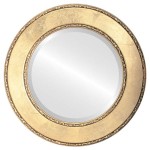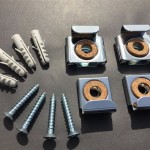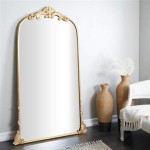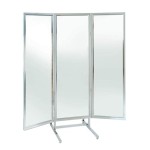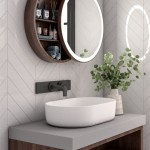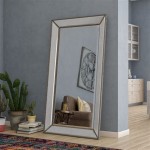Plastic Wall Mirrors: A Comprehensive Overview
Plastic wall mirrors represent a versatile and increasingly popular alternative to traditional glass mirrors. These mirrors, typically crafted from acrylic or polycarbonate, offer a range of advantages in terms of safety, weight, cost, and design flexibility. The material composition and manufacturing processes directly impact the mirror's performance and suitability for various applications. Understanding the properties and applications of plastic wall mirrors allows for informed purchasing decisions and optimal utilization.
The selection of the appropriate plastic material is crucial in determining the quality and performance of the final mirror. Acrylic, also known as polymethyl methacrylate (PMMA), is frequently used due to its optical clarity and relatively low cost. Polycarbonate, on the other hand, provides a higher degree of impact resistance, making it a more durable option for environments where breakage is a concern. The reflective surface is typically achieved through a vacuum metallization process, where a thin layer of metal, commonly aluminum, is deposited onto the plastic substrate. This metal layer is then protected by a coating to prevent oxidation and scratching. The quality of this coating significantly affects the mirror's longevity and resistance to environmental factors like humidity and cleaning agents.
The manufacturing process involves several key steps. First, the plastic sheet is extruded or cast to the desired thickness and dimensions. In the case of acrylic, casting often provides superior optical clarity compared to extrusion. Next, the sheet undergoes surface preparation, which may involve cleaning, polishing, and priming to ensure optimal adhesion of the metallic reflective layer. The metallization process is then carried out in a vacuum chamber, where the metal is vaporized and deposited onto the plastic surface. Finally, a protective backing is applied to shield the metallic layer from damage and to provide a surface for mounting hardware. Quality control measures are implemented throughout the manufacturing process to ensure consistent reflectivity, dimensional accuracy, and scratch resistance.
Key Advantages of Plastic Wall Mirrors
Plastic wall mirrors offer several compelling advantages over traditional glass mirrors. These benefits stem primarily from the inherent properties of the plastic materials used in their construction.
Safety and Shatter Resistance: One of the primary advantages of plastic mirrors is their inherent shatter resistance. Unlike glass mirrors, which can break into sharp, dangerous shards upon impact, plastic mirrors are less likely to shatter. Acrylic and polycarbonate exhibit significantly higher impact resistance than glass. In the event of breakage, they tend to crack or deform rather than shatter into numerous small pieces. This characteristic makes plastic mirrors a safer option for environments where children, pets, or individuals with mobility issues are present. In high-traffic areas or spaces prone to accidental impacts, the reduced risk of injury associated with plastic mirrors is a significant consideration.
Weight Reduction: Plastic materials are considerably lighter than glass. This weight reduction translates to easier handling, transportation, and installation. Larger mirrors, in particular, benefit from the reduced weight, as they can be mounted more securely and with less structural support. The lighter weight also reduces the risk of strain or injury during installation. This is particularly beneficial for DIY installations or in situations where specialized mounting hardware is not feasible. The reduced shipping costs associated with lighter materials further contribute to the overall cost-effectiveness of plastic mirrors.
Design Flexibility and Customization: Plastic materials offer greater design flexibility compared to glass. They can be easily cut, shaped, and molded into a variety of complex forms. This allows for the creation of customized mirror designs that are not easily achievable with glass. Plastic sheets can be thermoformed to create curved or contoured mirrors, expanding the design possibilities for architectural applications and decorative elements. Furthermore, plastic mirrors can be readily integrated with other plastic components, allowing for seamless integration into existing designs. The ability to print directly onto the plastic surface also opens up opportunities for incorporating decorative patterns, logos, or informational graphics onto the mirror's surface.
Applications of Plastic Wall Mirrors
The unique properties of plastic wall mirrors make them suitable for a diverse range of applications, spanning residential, commercial, and industrial settings.
Residential Applications: Within the home, plastic mirrors are frequently used in bathrooms, bedrooms, and hallways. Their shatter-resistant nature makes them a safe choice for children's rooms and play areas. The lighter weight facilitates easy installation on various wall surfaces. Decorative plastic mirrors can be used as focal points in living rooms or dining rooms, adding visual interest and depth to the space. In bathrooms, plastic mirrors are often preferred due to their resistance to moisture and humidity. The design flexibility of plastic allows for the creation of custom-shaped mirrors to fit specific bathroom layouts and vanity designs.
Commercial Applications: In commercial settings, plastic mirrors are employed in retail stores, gyms, dance studios, and healthcare facilities. Retail stores often use large plastic mirrors to create the illusion of greater space and to enhance the customer experience. Gyms and dance studios utilize plastic mirrors for observing and correcting form during exercise. The shatter-resistant nature of plastic mirrors is particularly important in these environments, where accidental impacts are common. Healthcare facilities often incorporate plastic mirrors in patient rooms and waiting areas, providing a safer and more aesthetically pleasing alternative to glass mirrors. The ease of cleaning and sanitization is also a significant advantage in healthcare settings.
Specialized Applications: Plastic mirrors find use in specialized applications where their unique properties are particularly beneficial. These include security mirrors in correctional facilities and warehouses, inspection mirrors in manufacturing environments, and lightweight mirrors in aerospace applications. Security mirrors made of polycarbonate are highly resistant to vandalism and tampering, providing a durable and reliable solution for surveillance. Inspection mirrors allow for visual access to hard-to-reach areas, facilitating maintenance and quality control. In aerospace applications, the reduced weight of plastic mirrors contributes to improved fuel efficiency and payload capacity. Furthermore, plastic mirrors can be designed to withstand the extreme temperature variations and vibration associated with aerospace environments.
Considerations When Choosing a Plastic Wall Mirror
Selecting the appropriate plastic wall mirror requires careful consideration of several factors, including the intended application, desired level of reflectivity, and budget constraints.
Material Type: The choice between acrylic and polycarbonate depends on the specific requirements of the application. Acrylic offers superior optical clarity and is generally more cost-effective, making it suitable for general-purpose applications where impact resistance is not a primary concern. Polycarbonate provides greater impact resistance and is recommended for environments where breakage is likely. The material's resistance to UV radiation should also be considered, especially for outdoor applications or locations exposed to direct sunlight. UV-resistant plastics will maintain their clarity and prevent yellowing over time.
Reflectivity and Optical Quality: The reflectivity of a plastic mirror is determined by the quality of the metallic coating and the smoothness of the plastic substrate. Higher-quality mirrors will exhibit a sharper and more accurate reflection. The reflective surface should be free from imperfections such as scratches, distortions, or blemishes. The optical quality of the plastic itself is also important, as any imperfections in the plastic can negatively impact the reflection. Look for mirrors that have been manufactured using high-quality materials and processes to ensure optimal reflectivity and optical clarity.
Mounting Options and Installation: The method of mounting the mirror will depend on its size, weight, and the type of wall surface. Smaller mirrors can be mounted using adhesive strips or double-sided tape. Larger mirrors may require more secure mounting hardware, such as screws, brackets, or French cleats. Ensure that the mounting hardware is appropriate for the weight of the mirror and the type of wall. Proper installation is essential to prevent the mirror from falling and causing injury or damage. It is recommended to consult with a professional installer if you are unsure about the proper installation techniques.
In summary, plastic wall mirrors provide a safe, lightweight, and versatile alternative to traditional glass mirrors. By understanding the properties of the materials used in their construction and the various applications for which they are suited, informed decisions can be made regarding their selection and implementation, ensuring optimal performance and longevity.

Decorative Wall Plastic Mirror At Best In Hyderabad Id 21274045130

Plastic Glass 10x14 Inch Wall Mirror At Rs 80 Piece In Rajpura Id 21994680955

Plastic Glass Wall Mounted 8x10 Inch Frame Mirror At Rs 37 In Rajpura

Space Age Plastic Wall Mirror By Tiger Plastics Holland 1970s 165018

Glass Simba Plastic Wall Mirror At Rs 280 In Guwahati Id 22027769112

Klevering Zigzag Wall Mirror Blue Made In Design

Space Age Design Vintage Plastic Wall Mirror By Tiger Plastics Holland 1970s 169127

Plastic Wall Mirror At Rs 90 Piece Fancy And Bathroom In Delhi Id 11315073491

Square Green Plastic Wall Mirror For Home Size 12x19 Inch At Rs 299 Piece In Chennai

Blue Plastic Rectangular Vintage Wall Mirror Design By A Affair At Pernia S Pop Up 2024

